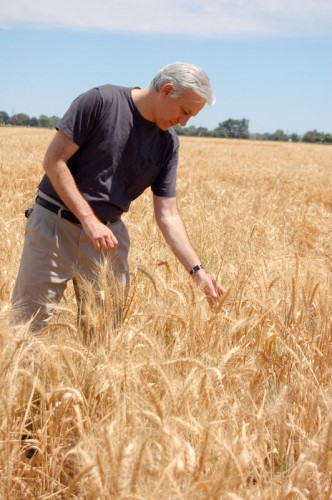The winners are Prof. Jorge Dovchovski from the University of Davis, California, USA and Prof. Leif Andersson, from the University of Uppsala, Sweden

The Wolff Award Committee for the year 2014 - XNUMX unanimously decided to award the award in equal parts to two: Prof. Jorge Dubcovsky from Davis University, California, USA and Prof. Leif Andersson from Uppsala University, Sweden
For their groundbreaking contribution in plant and animal science research, through the use of advanced technologies in genome research.
Prof. Dobchovski used advanced genomic research tools in order to clone essential genes in wheat, study their allelic diversity and introduce the best alleles into the best wheat plants. This approach, which combines basic and advanced knowledge, resulted in a dramatic change in the nutritional value of wheat, a change that intensified when it was made available to the scientific community. The list of traits studied by Prof. Dovchovski includes many genes that have a direct effect on wheat yield, such as cold resistance, the nutritional value of the grains, and more. It should be noted that, most impressively, this list includes over half of the wheat genes that have been cloned worldwide, a remarkable achievement considering the size of the wheat genome, its polyploid nature and the paucity of known genomic sequences. The research group under his leadership was directly responsible for the creation of the technology that enabled the creation of genetic libraries, and which was required for the development of genomic tools for wheat cloning. These libraries have been made available to the public. Recently, Prof. Dovchovski's group developed a technology that allows to disable each of the genes in wheat. One of Prof. Dovchovski's main contributions is the discovery of the genes responsible for the flowering mechanism in wheat, the control of these genes and the various alleles that make them up. As a result, an integrative model of the flowering mechanism in cereals was developed. The genetic markers of flowering are implemented in breeding programs worldwide. In the applied aspect, Prof. Dobchovski's most important discovery is the discovery of the gene for high protein content in grains. The expression or insertion of this gene into wheat increases the zinc and protein content by 10-15 percent.
This discovery has a very significant universal implication, due to the lack of zinc and protein in foods for newborns and toddlers, and it earned Prof. Dobchovski the "Discovery Award for 2007" from the USDA and the Hoagland Award for 2009 from the American Society of Plant Biologists.
Prof. Anderson led the development of the identification method based on markers and genes, which is required to select offspring with the best quality in farm animals. This method has replaced the classical methods of identification and selection on a phenotypic basis, and has a significant contribution to a sustainable food supply for the growing population of the world. Prof. Anderson is considered a leading international expert in the field of genetic evolution of animal domestication, especially in chickens. He was one of the first to use the RFLP technique for the analysis of genetic diversity at the DNA level of farm animals, studied the consequences of this diversity on economic aspects, and leads the research front in the field of animal genetics.
One of the main areas of his research is the identification of genetic changes that are the result of the domestication process. He was the first to use advanced sequencing technologies to detect "domestication" and revealed the molecular mechanism underlying several cases of "domesticated diversity", originally proposed by Darwin. Through the study of several unique phenotypes, which appeared in the domestication process, Prof. Anderson discovered and characterized several new and essential mechanisms related to muscle physiology, genetic control and motor coordination. This discovery in horses has direct implications for human diseases, such as multiple sclerosis.
Prof. Andersson was elected as a member of three different Royal Scientific Societies for Biology in Sweden, and was recently elected as a member from a foreign country to the US National Academy of Sciences.
The winners of the 2014 Wolf Prize in Arts and Sciences have been announced

One response
How do I get the research itself? want to do work on the subject.